| Srl | Item |
| 1 |
ID:
107148
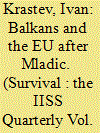

|
|
|
|
|
| Publication |
2011.
|
| Summary/Abstract |
Ten years after the last war in the region, the Balkans is still an assemblage of frustrated protectorates and weak states. Bosnia and Kosovo are trapped in the labyrinthine politics of semi-independence; Albania, Macedonia and Montenegro are small and claustrophobic republics with populist and divisive governments and opposition forces that are discouraged and discouraging at the same time. Serbia has not yet made up its mind how to reconcile its position on Kosovo with its aspiration to join the European Union. Croatia has succeeded in its accession talks with the EU, which closed on 30 June 2011, but the mood of the public is dire due to mismanagement and corruption scandals. The Balkans currently reflects a mixture of Greek-style economic problems, Berlusconi-style politics and Turkish-level hopes when it comes to joining the EU. With Italy and Greece facing deep political and economic troubles of their own, the Balkans has lost its natural advocates for EU membership.
|
|
|
|
|
|
|
|
|
|
|
|
|
|
|
|
| 2 |
ID:
016102
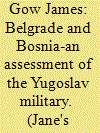

|
|
|
|
|
| Publication |
June 1993.
|
| Description |
243-246
|
|
|
|
|
|
|
|
|
|
|
|
|
|
|
|
| 3 |
ID:
109171
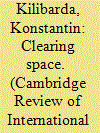

|
|
|
|
|
| Publication |
2011.
|
| Summary/Abstract |
This article examines recent shifts in Belgrade's urban geography and built environments, with an accent placed on landscapes of social cleansing, gentrification and commercialization accompanying Serbia's emerging neoliberal governmentality. It does so by exploring the convergent translocal discourses and institutional structures that provided financing, conditionality and legitimacy for the forcible displacement of a sizeable Roma community living under Belgrade's Gazela Bridge and their involuntary relocation into housing containers on the city's outskirts in late August 2009. The article juxtaposes the violence of this site-specific biopolitical intervention into Roma everyday life, which was executed by local city authorities and financed by European financial institutions, with the alternative strategies deployed by the community and its allies in contesting Belgrade's racialized urban restructuring. The Gazela episode illustrates how functional re-inscriptions of urban space for the translocal needs of capital can simultaneously generate both violent cartographies of dispossession and precarious forms of subaltern reterritorialization.
|
|
|
|
|
|
|
|
|
|
|
|
|
|
|
|
| 4 |
ID:
125536


|
|
|
|
|
| Publication |
2013.
|
| Summary/Abstract |
Kosovo's municipal elections in November are the first country wide polls since its declaration of independence. Eoin Ryan and Eric Randolph examine three scenarios for the vote and analyse Belgrade's influence on Kosovo's Serb minority in the north.
|
|
|
|
|
|
|
|
|
|
|
|
|
|
|
|
| 5 |
ID:
118666
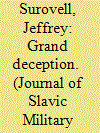

|
|
|
|
|
| Publication |
2012.
|
| Summary/Abstract |
It has long been widely assumed that Russia has been an ally of the Serbs and that it was in particular an anti-Western supporter of Belgrade during the wars of the 1990s. In fact, Russia, in cahoots with the Western powers and NATO, played a game of deception to make it appear that it was 'anti-Serbian' when in reality it acted as 'errand boy' in order to fulfill the West's objectives in the former Yugoslavia.
|
|
|
|
|
|
|
|
|
|
|
|
|
|
|
|
| 6 |
ID:
112176
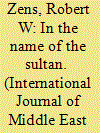

|
|
|
|
|
| Publication |
2012.
|
| Summary/Abstract |
This article examines the administration of Haci Mustafa Pasha, the military governor of Belgrade from 1793 to 1801. His appointment to this strategically located post was at odds with the contemporary trend in Ottoman provincial politics. Unlike most high-ranking provincial officials at this time, especially in the Balkans, Mustafa Pasha was not among the wealthy and militarily powerful ayan (local notables) but rather a career bureaucrat. His tumultuous and ultimately tragic administration reveals that his appointment was part of the attempt by Sultan Selim III (r. 1789-1807) to recentralize provincial governance. This study also provides a sociopolitical portrait of Belgrade and the surrounding region during the 18th century, as well as a brief look at the dangerous alliance of ayan and the janissaries.
|
|
|
|
|
|
|
|
|
|
|
|
|
|
|
|
| 7 |
ID:
073447
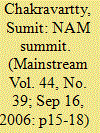

|
|
|
| 8 |
ID:
095589
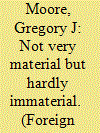

|
|
|
|
|
| Publication |
2010.
|
| Summary/Abstract |
In 1999 Sino-American relations experienced intense strain as a result of NATO's Kosovo intervention, and in particular by the bombing of the Chinese Embassy in Belgrade by an American B-2 bomber. Why did the bombing of China's embassy in Belgrade in the spring of 1999 touch such a raw nerve among the Chinese people and leadership? With the coming of the tenth anniversary of these events, what still needs to be explained is how Chinese and Americans could draw such divergent conclusions about that which they've never disagreed on-the incontestable fact of the embassy's demolition-and how the fact that what Americans called "a mistake" could almost completely derail Sino-American relations, which President Clinton in his very successful visit to China a year before had called a "strategic partnership." Based on a series of semistructured interviews the author did in Beijing and Washington with 28 Chinese and 30 American experts, this research draws a number of important conclusions in this regard. First, intensifying and even defining the conflict were a number of important perceptual gaps. Second, given the dispute over the intentionality of the embassy bombing, the conflict boiled down not to clashing interests, per se, but rather to issues of trust and beliefs about motives and intentions. Third, poor handling of the embassy bombing by both governments deepened the conflict and the alienation both sides felt. Fourth, underlying the lack of trust and the perceptual gaps between the two sides was "Fundamental Attribution Error.
|
|
|
|
|
|
|
|
|
|
|
|
|
|
|
|
| 9 |
ID:
185336
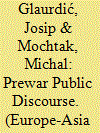

|
|
|
|
|
| Summary/Abstract |
We studied prewar public discourse by analysing the origin, content and sentiment of more than 4,000 letters written by people from all walks of life and published in the Belgrade broadsheet Politika loyal to the regime of Slobodan Milošević during the three years directly preceding the Yugoslav wars. Our analysis combined lexicon-based tools of automated topic and sentiment analysis with data on the sociodemographic characteristics of the letter writers and their localities. The results of our analysis show the importance of the politicisation of a history of violence in shaping public discourse in the run-up to war.
|
|
|
|
|
|
|
|
|
|
|
|
|
|
|
|
| 10 |
ID:
120905
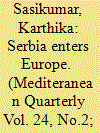

|
|
|
|
|
| Publication |
2013.
|
| Summary/Abstract |
In 2009, citizens of Serbia were finally allowed to make short trips to Schengen zone countries without visas. This represented a victory for the regime in Belgrade. A whole generation of Serbians had been held back from European travel by the visa requirement that was introduced as Yugoslavia disintegrated. However, this victory came at a price. Schengen countries worried that the lifting of the visa barrier would trigger a flood of illegal workers and asylum seekers from Kosovo. The Serbian government, which considers Kosovo to be an autonomous province, had to come up with an expedient solution to reassure wealthier European countries that allowing Serbians to "enter" would not open the gates to a large number of problematic visitors. Eventually, Belgrade agreed to restrict the privilege of visa-free travel for residents of Kosovo, formally differentiating Kosovar citizens from "normal" citizens. The imperatives of international mobility have forced a country, in a sense, to redraw its boundaries and to acknowledge a different status for a section of its population from a province that it continues to claim. This essay unpacks the puzzle of why supporters of the "integral Kosovo" position in Serbia resigned themselves to the compromise. The central argument is that states seek to secure mobility not only for economic reasons but also to mark themselves as normal, respectable members of the international community. Serbia's visa waiver decision provides a lens with which to view issues of mobility and national identity in one of the most complex and divided regions of the world.
|
|
|
|
|
|
|
|
|
|
|
|
|
|
|
|